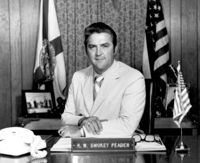Difference between revisions of "R. W. "Smokey" Peaden"
(New page: {{Infobox Biography | subject_name =R. W. "Smokey" Peaden | image_name =RWSmokeyPeaden.jpg | image_size =200px | image_caption = | date_of_birth = | place_of_birth = | date_of_...) |
|||
| Line 16: | Line 16: | ||
| signaturesize = | | signaturesize = | ||
}} | }} | ||
| − | '''Reubin W. "Smokey" Peaden''' was a law enforcement officer and gospel-singing politician who had served in the [[Pensacola Police Department]] for twelve years before being elected to the Florida House of Representatives in [[1972]] and re-elected in [[1974]]. | + | '''Reubin W. "Smokey" Peaden''' was a law enforcement officer and gospel-singing politician who had served in the [[Pensacola Police Department]] for twelve years before being elected to the Florida House of Representatives (representing [[Florida House of Representatives District 2|District 2]] in [[1972]] and re-elected in [[1974]]. |
The [[Escambia High School riots]], and the events leading up to them, took place while Peaden was in office, during which he and fellow legislator [[W. D. Childers]] voiced sympathy for white students and parents and offered to explain the "seriousness of the white backlash" to the NAACP.<ref>Gordon Harvey. ''A Question of Justice: New South Governors and Education, 1968-1976''.</ref> | The [[Escambia High School riots]], and the events leading up to them, took place while Peaden was in office, during which he and fellow legislator [[W. D. Childers]] voiced sympathy for white students and parents and offered to explain the "seriousness of the white backlash" to the NAACP.<ref>Gordon Harvey. ''A Question of Justice: New South Governors and Education, 1968-1976''.</ref> | ||
| Line 22: | Line 22: | ||
Peaden was allegedly planning a [[1980]] run for the office of [[Escambia County Sheriff]] when he was brought up on several drug charges. Witnesses claimed Peaden had trafficked cocaine with the intent to use the profits to fund his political campaign. Peaden denied distributing drugs and testified that he approached the State Attorney [[Curtis Golden]] in [[1979]] to provide names of drug dealers. | Peaden was allegedly planning a [[1980]] run for the office of [[Escambia County Sheriff]] when he was brought up on several drug charges. Witnesses claimed Peaden had trafficked cocaine with the intent to use the profits to fund his political campaign. Peaden denied distributing drugs and testified that he approached the State Attorney [[Curtis Golden]] in [[1979]] to provide names of drug dealers. | ||
| − | He was convicted on five counts on [[August 18]], [[1982]], which was affirmed on appeal. | + | He was convicted on five counts on [[August 18]], [[1982]], which was affirmed on appeal.<ref>[http://cases.justia.com/us-court-of-appeals/F2/727/1493/390017/ Justia.com]</ref> |
{{gov-bio-stub}} | {{gov-bio-stub}} | ||
| + | |||
| + | ==References== | ||
| + | {{reflist}} | ||
[[Category:Democratic politicians|Peaden, R W Smokey]] | [[Category:Democratic politicians|Peaden, R W Smokey]] | ||
Revision as of 13:00, 18 August 2009
| R. W. "Smokey" Peaden | |
|---|---|
| Occupation | Police officer, politician |
| Spouse | Barbara Jean Creel Peaden |
| Children | Debbie Sutton and Gary Peaden |
Reubin W. "Smokey" Peaden was a law enforcement officer and gospel-singing politician who had served in the Pensacola Police Department for twelve years before being elected to the Florida House of Representatives (representing District 2 in 1972 and re-elected in 1974.
The Escambia High School riots, and the events leading up to them, took place while Peaden was in office, during which he and fellow legislator W. D. Childers voiced sympathy for white students and parents and offered to explain the "seriousness of the white backlash" to the NAACP.[1]
Peaden was allegedly planning a 1980 run for the office of Escambia County Sheriff when he was brought up on several drug charges. Witnesses claimed Peaden had trafficked cocaine with the intent to use the profits to fund his political campaign. Peaden denied distributing drugs and testified that he approached the State Attorney Curtis Golden in 1979 to provide names of drug dealers.
He was convicted on five counts on August 18, 1982, which was affirmed on appeal.[2]
References
- ↑ Gordon Harvey. A Question of Justice: New South Governors and Education, 1968-1976.
- ↑ Justia.com
